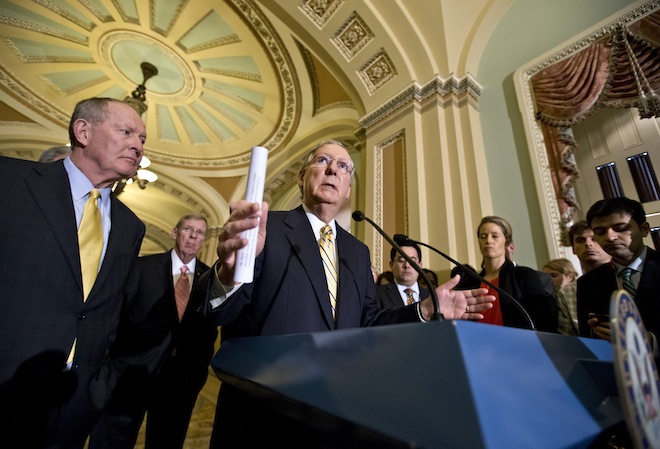After Senate Minority Leader Mitch McConnell (R-KY) warned Tuesday that going nuclear on filibuster reform for nominations would lead to the end of the 60-vote threshold for all matters, Democrats quickly pointed out that McConnell had supported a similar proposal during the 2005 filibuster battles.
Back then Democrats were in the minority and McConnell was part of the Republican leadership that was deeply frustrated with Democrats’ use of the filibuster against President Bush’s judicial nominees to fill coveted vacancies. McConnell supported eliminating the filibuster for Supreme Court and appeals court nominations.
“The filibuster would be preserved for all legislative items, preserved for executive branch nominations, not for the judiciary,” McConnell said on May 23, 2005. “If we have to exercise the constitutional option tomorrow, it will be narrowly crafted to deal only with future Supreme Court appointments and circuit court appointments, which is where we believe the aberrational behavior has been occurring in the past and may occur in the future.”
It was one of several remarks from McConnell during that era defending the prospect of ending the filibuster for certain nominations with a bare majority vote — what’s known as the nuclear option. Today it’s Senate Majority Leader Harry Reid (D-NV) who’s flabbergasted with the GOP’s unprecedented use of the filibuster, and is threatening to go nuclear and end it for presidential nominations — but not legislation.
And now McConnell is making the opposite argument of what he said in 2005.
“It would be naive to assume that you could break the rules of the Senate in order to change the rules for the Senate only for nominations,” McConnell told reporters on Tuesday. “There would be a widespread clamor across our conference, where we to be in the majority, to take that precedent and apply it to everything else.”
It’s yet another example of thoroughly the two parties’ positions have flipped since the mid-oughts, when Republicans controlled the Senate. However, Reid’s threats come as Republicans are using the filibuster in unparalleled ways.
In the 2000s, Democrats used it to block high-level judicial nominees they claimed were extreme or unqualified, and eventually caved in the face of GOP threats to use the nuclear option. Republicans, by contrast, have used it even when they lack a pretext of extraordinary circumstance. Examples include filibusters of Chuck Hagel, a former GOP senator, for secretary of defense, and Caitlin Halligan, a widely respected nominee for the powerful D.C. Circuit Court of Appeals. A recent nonpartisan government report found that President Obama’s judicial nominees have faced more delays and obstruction than any of the last six presidents.
Republicans are also using the filibuster to demand changes to agencies such as the Consumer Financial Protection Bureau by refusing to confirm anyone to run it. And they’re signaling they’ll block several of President Obama’s pending executive nominees and every one of his picks to fill three remaining vacancies on the D.C. Circuit Court of Appeals.
McConnell’s spokesman Don Stewart doesn’t deny that the Republican leader’s position has changed since he returned to the minority. But he points out that Reid warned of the slippery slope to a 51-vote Senate if a majority tries to end the filibuster for only nominations in his 2008 book “The Good Fight: Hard Lessons from Searchlight to Washington.”
“The storm had been gathering all year and word from conservative columnists and in conservative circles was that Senator Frist of Tennessee, who was the Majority Leader, had decided to pursue a rules change that would kill the filibuster for judicial nominations,” Reid wrote. “And once you opened that Pandora’s box, it was just a matter of time before a Senate leader who couldn’t get his way on something moved to eliminate the filibuster for regular business as well. And that, simply put, would be the end of the United States Senate.”
TPM asked Reid’s spokesman Adam Jentleson for his response to Republicans who are bringing up the Democratic leader’s warnings against the nuclear option from 2007.
“I would say they should save their breath,” Jentleson said.










